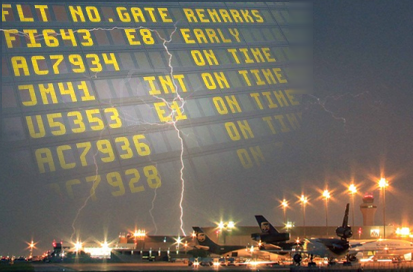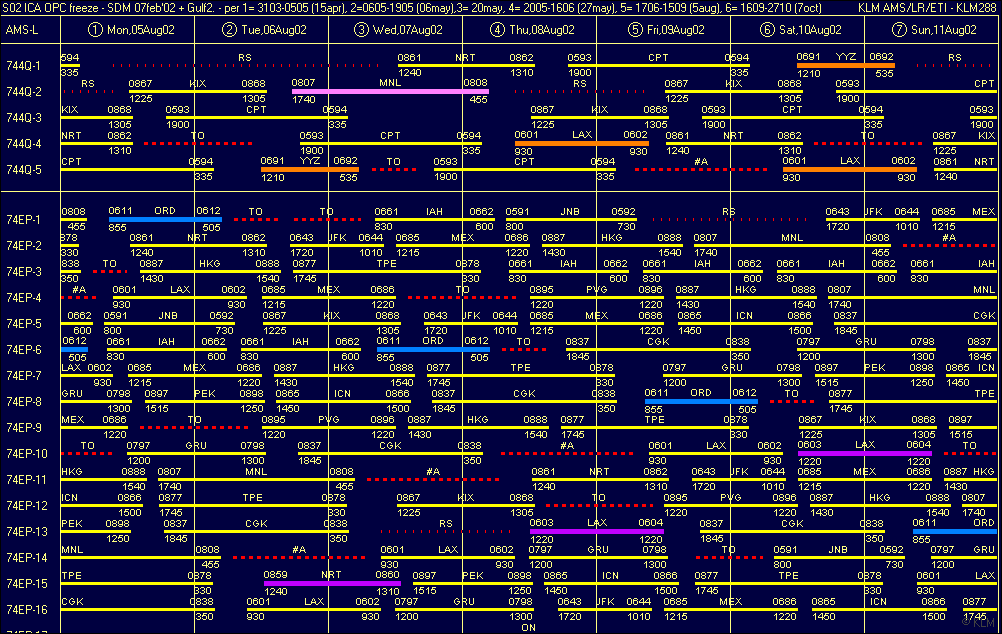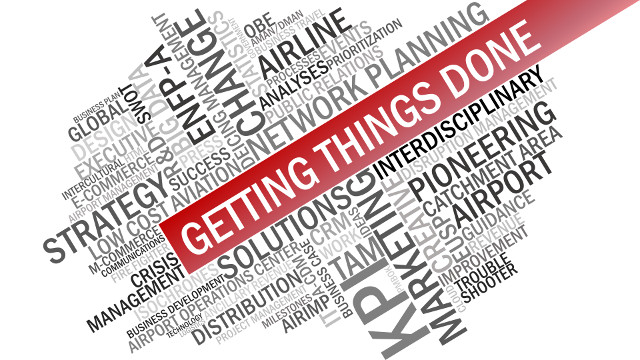
[edited]
Sharing the Bloomberg headline What Do You Want, Cheap Airfare or an On-Time Flight? Daniel (S.) today quoted from the article on LinkedIn: “An ultra-low-cost carrier will never, ever try to be as punctual as a big legacy #airline. Being on time all or most of the time costs money.”
After an initial misunderstanding we agree: That is stupid!
Delay and disruption management are the single most important influenceable cost factors in aviation today!
Yes, we can make good aircraft deals, we use revenue management to sell out tickets as expensive as we can in the low-cost world. But operations is the single most important cost driver we can influence today. We can neglect it, like many seasoned airline and airport managers do, we can deny and ignore it. And loose money.
 While doing the research at late delair for the Zurich Airport case study, focusing on the impact of a contemporary deicing management, just that improvement in (IT-supported) process saved about 20 million in one winter alone there. For Swiss (about 50% of the flights). Now working on a financial summary that thanks to the acquisition of delair by SITA never made it “to market”, I spoke with the OCC (Operations Control Center) manager of Swiss in Zurich. Who confirmed what they all knew (and know), but their management remains blissfully ignorant about: It is all about rotations in an airline. The aircraft starts somewhere in the morning and flies to different places throughout the day. And a disruption or delay anywhere en-route is prone to impact the entire rotation. Worse, a late aircraft usually accumulates more delays as ground handling is also tightly scheduled without spare manpower to cover up for such situations. Then crews fall out of schedule as they have to have their rest times. And while the airline may reduce the financial damage by calling for higher force on a snow event in the morning, on the flights down the line, I am told they tend to pay. And passenger compensation often exceeds the value of a single ticket!
While doing the research at late delair for the Zurich Airport case study, focusing on the impact of a contemporary deicing management, just that improvement in (IT-supported) process saved about 20 million in one winter alone there. For Swiss (about 50% of the flights). Now working on a financial summary that thanks to the acquisition of delair by SITA never made it “to market”, I spoke with the OCC (Operations Control Center) manager of Swiss in Zurich. Who confirmed what they all knew (and know), but their management remains blissfully ignorant about: It is all about rotations in an airline. The aircraft starts somewhere in the morning and flies to different places throughout the day. And a disruption or delay anywhere en-route is prone to impact the entire rotation. Worse, a late aircraft usually accumulates more delays as ground handling is also tightly scheduled without spare manpower to cover up for such situations. Then crews fall out of schedule as they have to have their rest times. And while the airline may reduce the financial damage by calling for higher force on a snow event in the morning, on the flights down the line, I am told they tend to pay. And passenger compensation often exceeds the value of a single ticket!
 In 2014 I wrote this article about Airport Operations Center (APOC), Airline Operations Control Center (OCC) and ATC’s Network Operations Center (NMOC) and how they do not communicate with each other. I asked just recently about a common airline system with decent, contemporary, f***ing basic interfaces and learned that none of my precious industry expert friends knows such. Worse, I got more feedback than I wanted about the issues all my friends in this industry can tell about; where thanks to missing such data flow, the right hand does not know what the left one is doing. In the process, trying to improve a bad situation, but working with different information, making things often enough worse.
In 2014 I wrote this article about Airport Operations Center (APOC), Airline Operations Control Center (OCC) and ATC’s Network Operations Center (NMOC) and how they do not communicate with each other. I asked just recently about a common airline system with decent, contemporary, f***ing basic interfaces and learned that none of my precious industry expert friends knows such. Worse, I got more feedback than I wanted about the issues all my friends in this industry can tell about; where thanks to missing such data flow, the right hand does not know what the left one is doing. In the process, trying to improve a bad situation, but working with different information, making things often enough worse.
I also heard just this week, how airline managers love the big planes (A380), a Lufthansa manager was quoted that they love the big bird, but that they don’t know if they can ever be operated long-term commercially revenue-making. Or read a comment, how much these airline “managers” love new inflight entertainment and seats and fancy stuff. But don’t understand, why Windows-XP-machines in their OCC need replacement. It’s “fancy”, touchable, visible to see the airplane or fancy seats, but no-one sees the impact of deicing. Okay, we have a winter-delay. Who cares, we’ve calculated it into our prices forever and it’s been always like this. It can be improved? Who cares.
 And while the airlines benefit, I hear from the airports that they do not show any interest in A-CDM and A-CDM improvements. While they cut into the flesh on most airport’s fees, while they let them starve; while most airports need to invest heavily to compensate the losses from “aircraft handling” by doing their best to increase “non-aviation revenue”, while this is daily life today, airlines demand airports to invest into those technologies and development and process improvements, but are not willing to pay. Did Swiss pay a Penny (Rappen) for the improved deicing at their home airport? Make a guess.
And while the airlines benefit, I hear from the airports that they do not show any interest in A-CDM and A-CDM improvements. While they cut into the flesh on most airport’s fees, while they let them starve; while most airports need to invest heavily to compensate the losses from “aircraft handling” by doing their best to increase “non-aviation revenue”, while this is daily life today, airlines demand airports to invest into those technologies and development and process improvements, but are not willing to pay. Did Swiss pay a Penny (Rappen) for the improved deicing at their home airport? Make a guess.
So while I know that seasoned managers in aviation act that stupid and short-sighted. Delay and Disruption Management is the single most important factor we can influence to save big money.
As I should have known Daniel’s opinion, i.e. from his LinkedIn article about why airlines burn money every day I keep myself referring to.
And if you need someone to discuss such projects or to manage them? Keep me in mind. And Daniel 😉
Food for Thought
Comments welcome!

![“Our Heads Are Round so our Thoughts Can Change Direction” [Francis Picabia]](https://foodforthought.barthel.eu/wp-content/uploads/2021/10/Picabia-Francis-Round-Heads.jpg)
Comments
Tough words on me, Juergen!
The text in the article says “An ultra-low-cost carrier will never, ever try to be as punctual as a big legacy airline. Being on time all or most of the time costs money. Delta Air Lines Inc., for example, has spent enormous sums in recent years to move toward the head of the industry pack in quashing delays.”
The author is ?
Thanks!
As discussed, there was a misunderstanding from the way you quoted, we resolved it and agree. i corrected the text.